
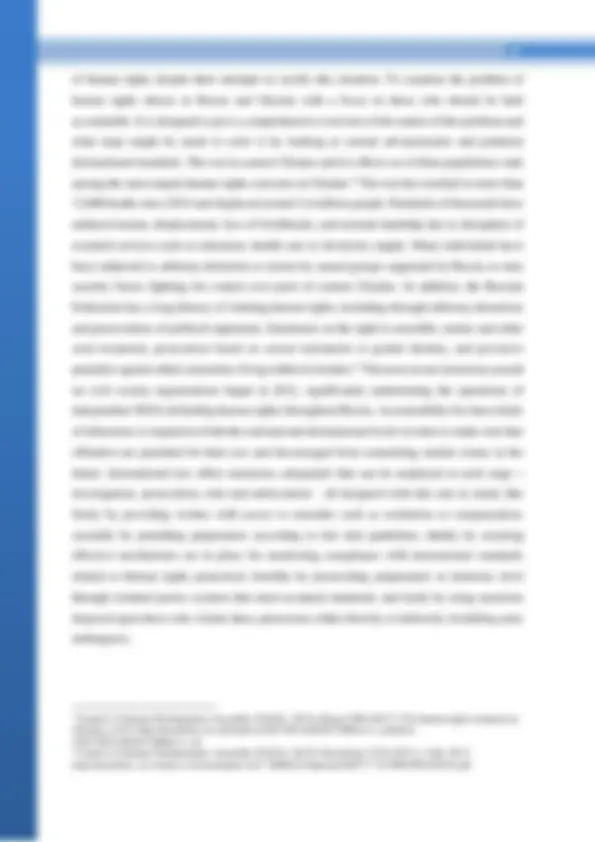
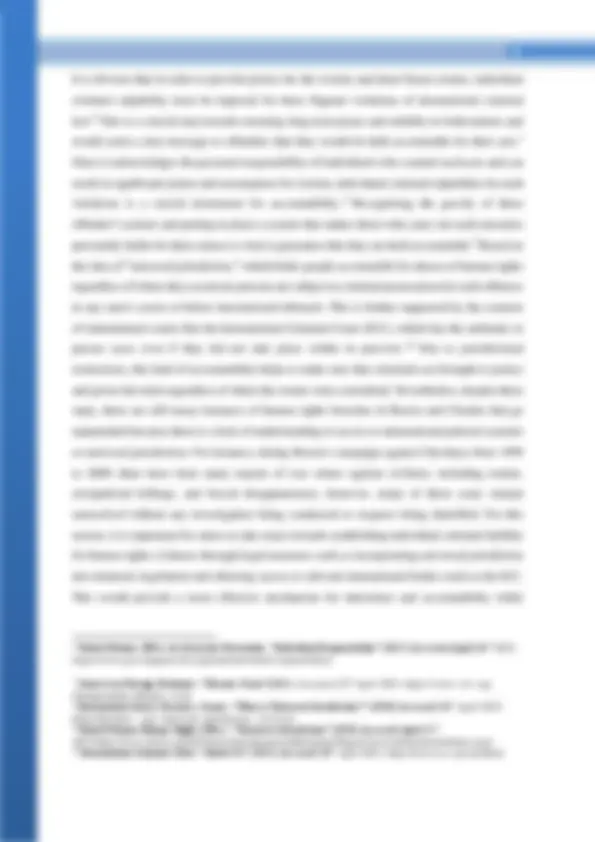
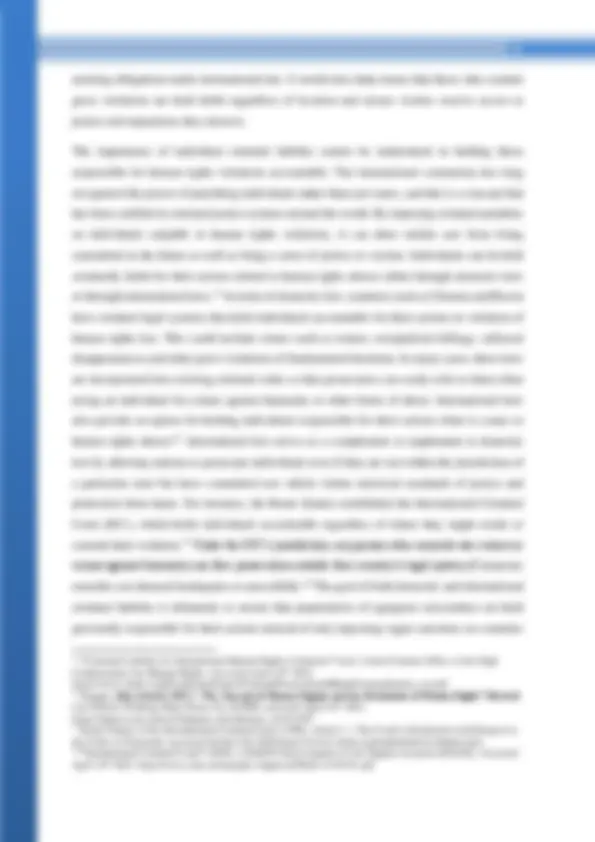
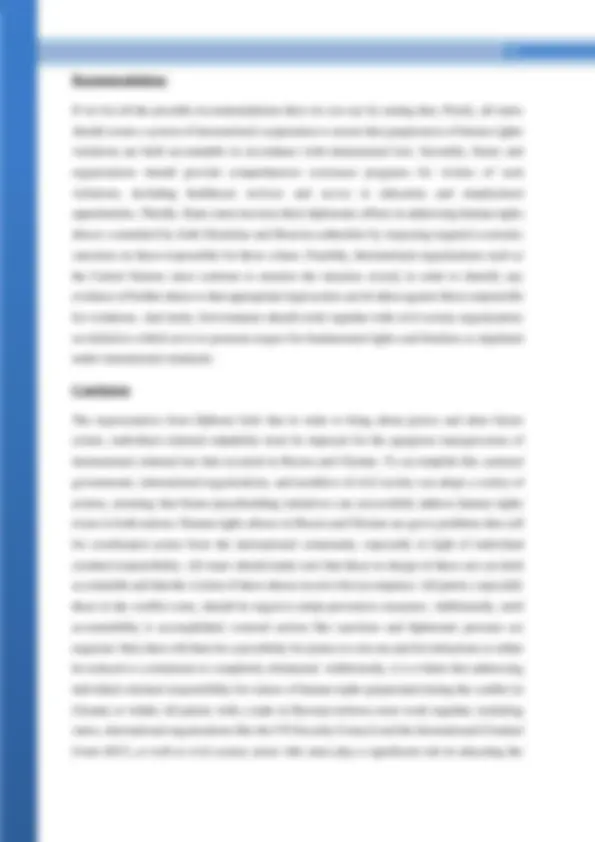

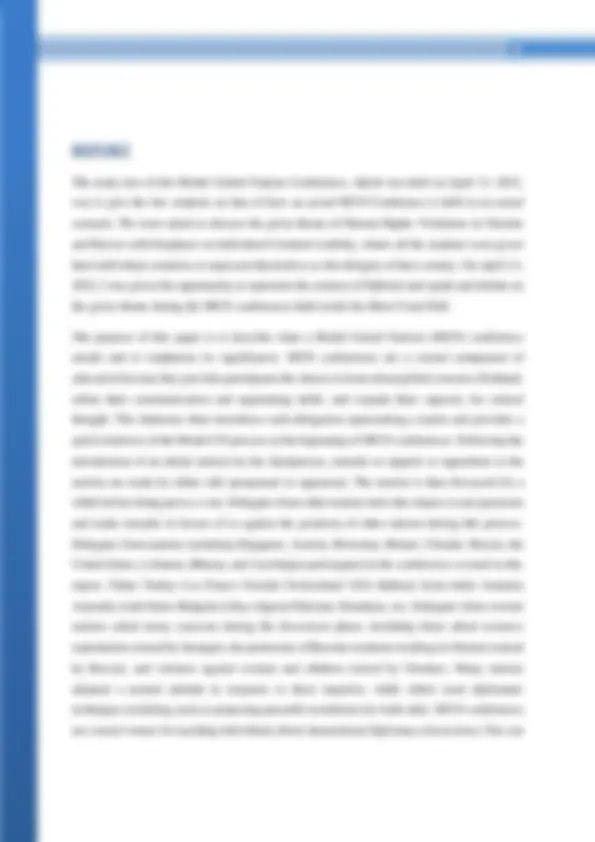



Study with the several resources on Docsity

Earn points by helping other students or get them with a premium plan


Prepare for your exams
Study with the several resources on Docsity

Earn points to download
Earn points by helping other students or get them with a premium plan
Community
Ask the community for help and clear up your study doubts
Discover the best universities in your country according to Docsity users
Free resources
Download our free guides on studying techniques, anxiety management strategies, and thesis advice from Docsity tutors
I have covered the position paper for the Public International Law
Typology: Exams
1 / 13

This page cannot be seen from the preview
Don't miss anything!








nd
AGENDA – Discussing the human rights violations in Ukraine and Russia with special emphasis on the need to impose individual criminal liability owing to gross violations of International Criminal law. The issue of human rights violations in Ukraine and Russia is a long-standing and deeply ingrained problem. Both countries have a history of authoritarian rule, with frequent instances of mistreatment, discrimination, and abuse of human rights.^1 In recent years, the situation has grown even more concerning, with the ongoing conflict in eastern Ukraine and the annexation of Crimea by Russia.^2 In this position paper, we will examine the human rights situation in both countries, with a specific focus on individual criminal liability. We will argue that individual accountability is critical to addressing the human rights violations, and we will present recommendations for how this can be achieved. Ukraine has been in the midst of an armed conflict since 2014, when Russia annexed Crimea and supported separatists who have declared independence from Ukraine. Since then, human rights violations have been rampant throughout eastern Ukraine, including widespread arbitrary detention, torture, disappearances and extrajudicial killings. In addition, there has been a systematic attack on freedom of expression, association and assembly by both sides. In Russia itself, there have been multiple reports of human rights abuses against political opponents, ethnic and religious minorities—especially LGBT individuals—and those who criticize the government’s activities. 3 Both Russia and Ukraine’s human rights condition continue to be of concern. Both nations continue to experience recurrent breaches and abuses (^1) Amnesty International. 2020. “Ukraine: Unspeakable Human Rights Abuses in Eastern Ukraine”. https://www.amnesty.org/en/latest/campaigns/2020/02/ukraine-unspeakable-human-rights-abuses-in-eastern- ukraine/ (^2) United Nations High Commissioner for Human Rights. 2019. “Russia: Systematic Attacks on Civilians, Human Rights and Freedoms in Crimea”. https://www.ohchr.org/EN/Countries/ENACARegion/Pages/RUIndex.aspx (^3) European Court of Human Rights (ECHR). 2015. “Freedom of Expression in Russia”, Press Release No 871, 12 October 2015, http://hudoc.echr.coe.int/eng#{%22itemid%22:[%22001-153244%22]}.
It is obvious that in order to provide justice for the victims and deter future crimes, individual criminal culpability must be imposed for these flagrant violations of international criminal law.^6 This is a crucial step towards ensuring long-term peace and stability in both nations and would send a clear message to offenders that they would be held accountable for their acts.^7 Since it acknowledges the personal responsibility of individuals who commit such acts and can result in significant justice and recompense for victims, individual criminal culpability for such violations is a crucial instrument for accountability. 8 Recognising the gravity of these offender’s actions and putting in place a system that makes those who carry out such atrocities personally liable for their crimes is vital to guarantee that they are held accountable.^9 Based on the idea of “universal jurisdiction,” which holds people accountable for abuses of human rights regardless of where they occurred, persons are subject to criminal prosecution for such offences in any state's courts or before international tribunals. This is further supported by the creation of international courts like the International Criminal Court (ICC), which has the authority to pursue cases even if they did not take place within its purview. 10 Due to jurisdictional restrictions, this kind of accountability helps to make sure that criminals are brought to justice and given fair trials regardless of where the crimes were committed. Nevertheless, despite these steps, there are still many instances of human rights breaches in Russia and Ukraine that go unpunished because there is a lack of understanding or access to international judicial systems or universal jurisdiction. For instance, during Russia's campaign against Chechnya from 1999 to 2009, there have been many reports of war crimes against civilians, including torture, extrajudicial killings, and forced disappearances; however, many of these cases remain unresolved without any investigation being conducted or suspects being identified. For this reason, it is important for states to take steps towards establishing individual criminal liability for human rights violators through legal measures such as incorporating universal jurisdiction into domestic legislation and allowing access to relevant international bodies such as the ICC. This would provide a more effective mechanism for deterrence and accountability while (^6) United Nations Office on Genocide Prevention: “Individual Responsibility” (2017) Accessed April 16th (^) 2023: https://www.preventgenocide.org/learn/individual-responsibility/ (^7) Council on Foreign Relations: “Ukraine Crisis”(2021) Accessed 16th (^) April 2023: https:// www .cfr .org /backgrounder /ukraine - crisis (^8) International Justice Resource Center: “What is Universal Jurisdiction?” (2020) Accessed 16th (^) April 2023: https://ijrcenter. org / universal - jurisdiction - overview (^9) United Nations Human Rights Office: “Universal Jurisdiction” (2020) Accessed April 15th 2023,https://www.ohchr.org/EN/Issues/JurisdictionAndImmunity/Pages/UniversalJurisdictionIndex.aspx (^10) International Criminal Court: “About Us” (2021) Accessed 16th (^) April 2023: https://www.icc-cpi.int/about
meeting obligations under international law. It would also help ensure that those who commit gross violations are held liable regardless of location and ensure victims receive access to justice and reparations they deserve. The importance of individual criminal liability cannot be understated in holding those responsible for human rights violations accountable. The international community has long recognized the power of punishing individuals rather than just states, and this is a concept that has been codified in criminal justice systems around the world. By imposing criminal penalties on individuals culpable in human rights violations, it can deter similar acts from being committed in the future as well as bring a sense of justice to victims. Individuals can be held criminally liable for their actions related to human rights abuses either through domestic laws or through international laws.^11 In terms of domestic law, countries such as Ukraine and Russia have criminal legal systems that hold individuals accountable for their actions in violation of human rights law. This could include crimes such as torture, extrajudicial killings, enforced disappearances and other grave violations of fundamental freedoms. In many cases, these laws are incorporated into existing criminal codes so that prosecutors can easily refer to them when trying an individual for crimes against humanity or other forms of abuse. International laws also provide an option for holding individuals responsible for their actions when it comes to human rights abuses^12. International law serves as a complement or supplement to domestic law by allowing nations to prosecute individuals even if they are not within the jurisdiction of a particular state but have committed acts which violate universal standards of justice and protection from harm. For instance, the Rome Statute established the International Criminal Court (ICC), which holds individuals accountable regardless of where they might reside or commit their violation.^13 Under the ICC’s jurisdiction, any person who commits war crimes or crimes against humanity can face prosecution outside their country’s legal system if domestic remedies are deemed inadequate or unavailable.^14 The goal of both domestic and international criminal liability is ultimately to ensure that perpetrators of egregious misconduct are held personally responsible for their actions instead of only imposing vague sanctions on countries (^11) “Criminal Liability for International Human Rights Violations” (n.d). United Nations Office of the High Commissioner for Human Rights. Accessed April 16th^2023. https://www.ohchr.org/Documents/Issues/CriminalProsecution/HRandCriminalJustice_en.pdf (^12) Ruggie, John Gerard (2005). “The Concept of Human Dignity and the Realization of Human Rights” Harvard Law School Working Paper Series No 19/2005, accessed April 16th^ 2023. https://papers.ssrn.com/sol3/papers.cfm?abstract_id= (^13) Rome Statute of the International Criminal Court (1998), Article 1 – The Court's Jurisdiction with Respect to the Crime of Genocide, accessed October 5th 2020 https://www2.ohchr.org/english/law/iccStatute.htm (^14) “International Criminal Court” (2020). UNESCO Encyclopedia of Life Support Systems (EOLSS). Accessed April 16th^ 2023. http://www.eolss.net/sample-chapters/c06/e6- 23 - 03 - 01.pdf
accountability.^15 Additionally, States Parties are required by customary international law to “ensure respect of its obligations under international law,” which provides even another justification for individual criminal liability.^16 In terms of domestic legislation, both countries have adopted comprehensive laws addressing various aspects related to crimes against humanity. For instance, The Russian Federation Code on Criminal Procedure contains several articles focusing specifically on war crimes,^17 while Ukrainian legislation also addresses various threats against human life or health arising out of violations against diplomatic or consular agents. 18 In addition, both countries have also established specialized tribunals tasked with adjudicating cases concerning atrocities committed during armed conflicts. These tribunals provide an efficient judicial system capable of prosecuting perpetrators who commit or otherwise participate in egregious acts violating fundamental rights protected by international law. Despite these legal frameworks designed specifically for prosecuting individuals responsible for war crimes or other atrocities committed during armed conflict situations, there remain gaps in implementation when it comes to ensuring justice for victims had suffered grave human rights violation due to lack of political will or resources. In particular, certain high-ranking officials implicated in crimes may not be held accountable due their privileged position within the State structure thus undermining respect for orders issued from these tribunals. To address this issue there has been calls from various non-governmental organizations (NGOs),^19 academics and other entities advocating enhanced measures aimed at strengthening enforcement mechanisms capable tackling systemic impunity at all levels within government hierarchy. International Response to Human Rights Violations: Collective Responsibility vs Individual Liability The concept of collective responsibility has become increasingly important when discussing effective strategies needed to address. (^15) International Covenant on Civil and Political Rights (ICCPR), (1966). Retrieved from https://www2.ohchr.org/english/law/ccpr.htm (^16) International Law Commission, “Draft Articles on Responsibility of States for Internationally Wrongful Acts” in Report of the International Law Commission, 2001 (A/56/10) (^17) The Russian Federation Code on Criminal Procedure, http://www.consultant.ru/document/cons_doc_LAW_28102/ (^18) Ukrainian legislation addressing various threats against human life or health arising out of violations against diplomatic or consular agents, https://zakon.rada.gov.ua/go/722- 18 (^19) NGO Monitor, “International Response to Human Rights Violations: Collective Responsibility vs Individual Liability," https://www.ngo-monitor.org/reports/international-response-to-human-rights-violations-collective- responsibility-vs-individual-liability/.
Recommendations If we list all the possible recommendations then we can say by stating that, Firstly, all states should create a system of international cooperation to ensure that perpetrators of human rights violations are held accountable in accordance with international law. Secondly, States and organizations should provide comprehensive assistance programs for victims of such violations, including healthcare services and access to education and employment opportunities. Thirdly, States must increase their diplomatic efforts in addressing human rights abuses committed by both Ukrainian and Russian authorities by imposing targeted economic sanctions on those responsible for these crimes. Fourthly, International organizations such as the United Nations must continue to monitor the situation closely in order to identify any evidence of further abuse so that appropriate legal action can be taken against those responsible for violations. And lastly, Governments should work together with civil society organizations on initiatives which serve to promote respect for fundamental rights and freedom as stipulated under international standards. Conclusion The representative from Djibouti feels that in order to bring about justice and deter future crimes, individual criminal culpability must be imposed for the egregious transgressions of international criminal law that occurred in Russia and Ukraine. To accomplish this, national governments, international organisations, and members of civil society can adopt a variety of actions, ensuring that future peacebuilding initiatives can successfully address human rights issues in both nations. Human rights abuses in Russia and Ukraine are grave problems that call for coordinated action from the international community, especially in light of individual criminal responsibility. All states should make sure that those in charge of these acts are held accountable and that the victims of these abuses receive fair recompense. All parties, especially those in the conflict zone, should be urged to adopt preventive measures. Additionally, until accountability is accomplished, external actions like sanctions and diplomatic pressure are required. Only then will there be a possibility for justice to win out and for infractions to either be reduced to a minimum or completely eliminated. Additionally, it is evident that addressing individual criminal responsibility for crimes of human rights perpetrated during the conflict in Ukraine or within All parties with a stake in Russian territory must work together, including states, international organisations like the UN Security Council and the International Criminal Court (ICC), as well as civil society actors who must play a significant role in educating the
The main aim of this Model United Nations Conference, which was held on April 13, 2023, was to give the law students an idea of how an actual MUN Conference is held in an actual scenario. We were asked to discuss the given theme of Human Rights Violations in Ukraine and Russia with Emphasis on Individual Criminal Liability, where all the students were given their individual countries to represent themselves as the delegate of that country. On April 13, 2023, I was given the opportunity to represent the country of Djibouti and speak and debate on the given theme during the MUN conferences held inside the Moot Court Hall. The purpose of this paper is to describe what a Model United Nations (MUN) conference entails and to emphasise its significance. MUN conferences are a crucial component of education because they provide participants the chance to learn about global concerns firsthand, refine their communication and negotiating skills, and expand their capacity for critical thought. The chairman often introduces each delegation representing a nation and provides a quick rundown of the Model UN process at the beginning of MUN conferences. Following the introduction of an initial motion by the chairperson, remarks in support or opposition to the motion are made by either side (proponent or opponent). The motion is then discussed for a while before being put to a vote. Delegates from other nations have the chance to ask questions and make remarks in favour of or against the positions of other nations during this process. Delegates from nations including Singapore, Austria, Botswana, Brunei, Ukraine, Russia, the United States, Lebanon, Bhutan, and Azerbaijan participated in the conference covered in this report. China Turkey Los France Sweden Switzerland USA Bahrain Syria India Armenia Australia Arab States Bulgaria Libya Algeria Pakistan, Honduras, etc. Delegates from several nations asked many concerns during the discussion phase, including those about resource exploitation (raised by Senegal), the protection of Russian residents residing in Ukraine (raised by Russia), and violence against women and children (raised by Ukraine). Many nations adopted a neutral attitude in response to these inquiries, while others used diplomatic techniques including such as proposing peaceful resolutions for both sides. MUN conferences are crucial venues for teaching individuals about international diplomacy discussions. One can
obtain insight into actual talks between countries on international problems by participating in debates with officials from other like-minded countries. Djibouti voiced its deep concern in the 6th Committee of the UN General Assembly on the ongoing abuses of human rights in Russia and Ukraine. The nation acknowledged that in order to stop the ongoing suffering of innocent individuals impacted by these events, it was critical to promote justice and responsibility. The necessity for international collaboration between nations was then emphasised by Djibouti in order to guarantee that those guilty for such crimes be held accountable and brought before the law. Djibouti further supported its position by calling for a comprehensive reform of international criminal law that ensures individual criminal liability for perpetrators of human rights violations. The country encouraged other countries to ratify and implement international legal instruments, such as the Rome Statute of the International Criminal Court, as well as regional treaties providing for individual criminal responsibility. This would help ensure that all individuals involved in international crimes could be held legally responsible on an equal footing, regardless of their nationality or statehood status. In addition, Djibouti proposed measures such as providing assistance to UN mechanisms that investigate human rights violations, strengthening the capacity of national criminal justice systems to handle cases of individual criminal liability, conducting widespread public awareness campaigns about this issue, and establishing a platform where victims can access legal remedies against perpetrators. Finally, Djibouti recognized that states have a duty to cooperate with each other in prosecuting those responsible for human rights violations through international courts or tribunals. Through my MUN conferences, I have learned many valuable lessons that can shape the way I approach problems and conflicts in the future. This taught me the importance of understanding multiple perspectives when trying to reach an agreement or consensus. Participating in MUN conferences, I gained a better understanding for international diplomacy and politics. When researching for my role as a delegate, I had to understand complex political situations and think critically about how different countries would address certain topics or agendas. With this knowledge, I can now make more informed decisions, both professionally and personally. Overall, Model United Nations conferences provide an opportunity for law students to gain a better understanding of diplomacy, global issues, and international cooperation. It also gives them a platform to develop communication and critical thinking skills. The conference that I attended showcased the importance of understanding multiple perspectives when dealing with